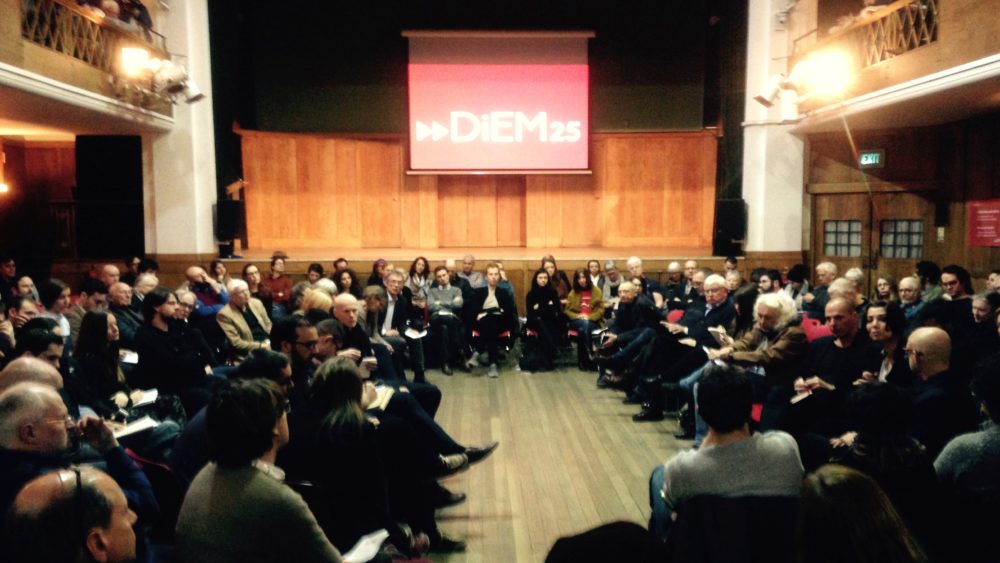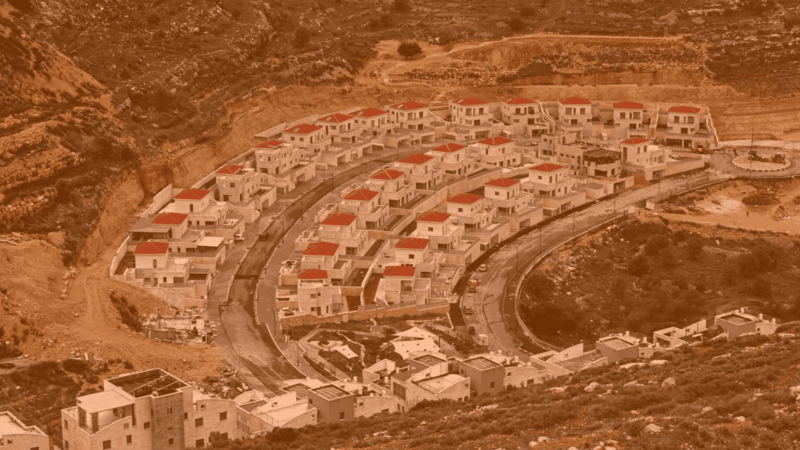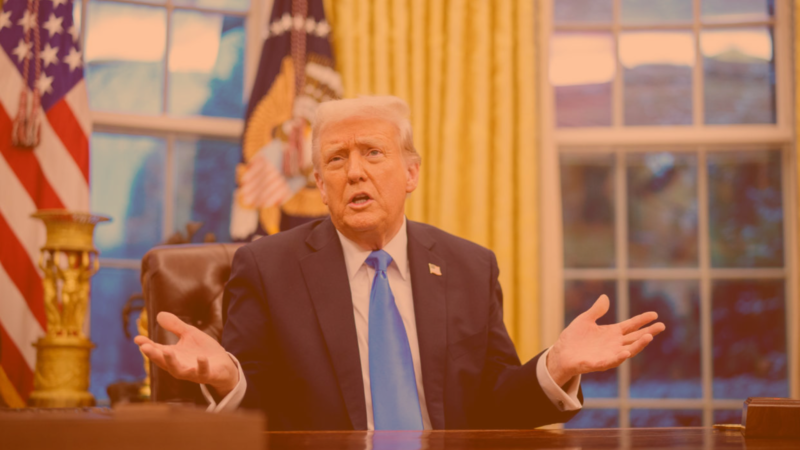by Andrew J. Brown
On Saturday morning, January 28, 2017, at Conway Hall in Central London, long an important place for radical religious, philosophical, social and political thinking in the UK, DiEM25 held its UK organisational launch.
Like all DiEM25 gatherings, more than half of the meeting was made up of conversations involving those attending. To set the scene and introduce some important initial ideas, the morning began with brief contributions from Brian Eno, Elif Şafak, Agnieszka Wiśniewska, Igor Stokfiszewski and, finally, Yanis Varoufakis.
The first speaker, the British musician and composer Brian Eno, began by noting that the venue, Conway Hall in London, was a place he knew personally because in the late 1960s he used to come here to hear avant-garde music concerts. This memory, in turn, reminded him of another time, like the present one, when everything was changing and when a great deal of radical rethinking was going on. He noted, however, that in the 1970s much of this kind of thinking was reversed by an Ayn Rand-inspired selfishness that developed into simplistic ideas of how societies should run themselves and which even begun to question, as Thatcher famously did, whether there was, in fact, any such thing as society. Eno pointed out that although the 70s were followed by a few decades of prosperity and a huge amount of wealth creation, this wealth was eventually concentrated in only the hands of a few and we simultaneously saw the stagnation of the wages of everybody else. For Eno this dangerous gulf finally became clear to everyone last year and marked the end of a forty year period of decline. Suddenly the idea of doing politics, which people of his generation often thought was “akin to masturbating in public and to be avoided at all costs”, was something once again worth engaging in.
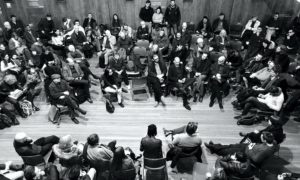
Eno, a key figure in the development of electronic music, was also keen to note an important phenomenon concerning the interrelation of technology and democracy. He told the meeting that many of his high-tech friends in places like Silicone Valley had carefully avoided politics for a very long time because they expected that technology would “be the de facto solution to our problems”; for them politics unnecessarily “complicated the plot.” But recent events had helped us all understand that merely going along with “the drift of things” is not enough because “the technologies won’t make the choices for us, they need our guidance and our input as well.” The need to make conscious political choices was memorably summed up by Eno when he said that after the election of a serial liar in the form of Trump and, in England, of [Boris] Johnson, people had finally begun “to realise that that the laissez-faire doesn’t work — while we’re laissez-ing they’re still faire-ing — so suddenly we’re starting to think that politics might be worth doing again.” Ultimately, Eno felt that this was what DiEM25 is about: it is a movement to revive and reinvigorate this thinking that we must make choices.
The next speaker was Elif Şafak, the Turkish author, columnist and academic who brought to the meeting an important set of perspectives from the current Turkish context. She began by noting that if you come from a country where democracy is obviously and openly being seriously challenged “you simply did not have the luxury of being apolitical.” But, she reminded us, one of the important, wonderful things we could learn from feminism is a recognition that politics is not only about what goes on in parties and parliaments but also about “what goes on in our private spaces, in our bedrooms, in our kitchens, in our daily lives; politics is where ever there is power.” Şafak felt that the important thing to see here was that when approached in this broader sense it was, in fact, now impossible truly to be apolitical.
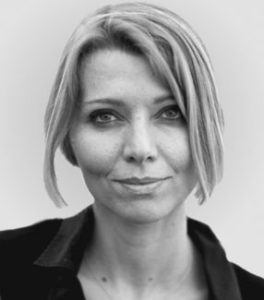
Elif Şafak, DiEM25 Coordinating Collective member
Şafak also noted that it was vital to ensure that politics ceases being merely a matter of “Left verses Right”. These old binaries led only to catastrophes and, for her, the question today is whether we are “pro tribalism and isolationism or in favour of a progressive constructive humanism?” She pointed strongly to the need to develop a real, deep sense that we are genuinely all in this together. She observed that we need more people who are acquainted with different cultures to become involved in the public space and to speak up — and we also certainly need more women’s voices and stories to be told and heard.
Şafak then raised a question about “popularism” and noted that one of its strategies is to undermine knowledge by speaking to gut feelings. This requires us to do two things. The first is to acknowledge that those on the liberal, left and progressive end of the political spectrum have not been at all good at connecting with people’s emotions . She reminded the meeting of the need to allow people to talk about their anxieties, angsts and angers, since this is “an age of anxiety.” The question is how do we create a language for those people (not in the room), who have been attracted by the kinds of “popularism” which have so successfully already picked up on these emotions? For Şafak, to address this properly it is vitally important that we develop our own emotional intelligence and find ways to make it possible for people to talk about immigrants, refugees, about losing one’s identity and culture but in a way that channels those feelings into better, more democratic and inclusive ways of being together. The second thing that the rise of popularism requires us to do is never to forget the vital importance of knowledge and facts but always to ensure that they are spoken about with emotional intelligence. A key overall point from Şafak was that writers have an important role to play because they are in positions to bring about this mix by adding good story telling to facts and knowledge.
The next two speakers were Agnieszka Wiśniewska and Igor Stokfiszewski from Krytyka Polityczna (krytykapolityczna.pl) and DiEM25’s Co-ordinating Committee.
Wiśniewska saw her work as chief editor of a political magazine as a matchmaker between grass roots movements, activists and academics so that, together, they can begin to fight for progressive change and real democracy. She told the meeting that her passion for DiEM25 was because it provides an ideal context to meet people from different backgrounds and skills but who still share the same ambitions.
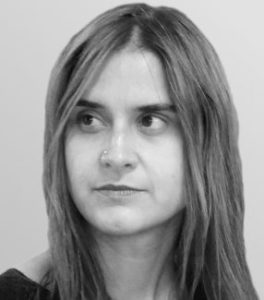
Agnieszka Wiśniewska
Both Wiśniewska and Stokfiszewski noted that they were in the UK because they had many friends now working here and they remind us that theirs was a community that had been seriously shaken by the Brexit vote, the rise of anti-immigrant rhetoric and also the increase in violence which has, as we all know, included at least one horrific murder. Wiśniewska and Stokfiszewski were aiming, in the first instance, to work with DiEM25 in the UK to build a progressive force so that there is a chance for a fair and sustainable transition out of the EU for everyone— including the Polish community. But this UK-centred concern allowed Stokfiszewski to offer the meeting an additional wider, pan-European point. He did this by raising the rhetorical question of why the leftist project in Poland has, up until this point anyway, failed so badly? For him the answer was that in Poland they had been selfish, they had not understood that “it is not enough to work in one country alone to achieve progressive goals — it has to be wider project” and that they now knew they needed “to work pan-Europeanly and globally.” For them, DiEM25 is the project which can help achieve this; DiEM25 is “a new choice and an opportunity to be seized.”
Wiśniewska concluded that soon Poland will be a major battleground for progress and liberty and she expressed a hope that they will be able to learn what do in order to “reverse the course of authoritarianism that Poland is currently taking.”
The first part of the meeting was then concluded by some remarks by Yanis Varoufakis.
Varoufakis reminded us that, in 2016, passion came back to politics, but in the wrong way for it was now fuelling not progressive polices but regressive ones. He rehearsed DiEM25’s “radical remain” position of being “in the EU against the EU” but reminded the meeting that we failed to convey to those sympathetic to DIEM25’s position of “constructive disobedience” that we could, in fact, change anything; our inability as a progressive movement to impress upon people that we could win government was why we lost the referendum.
Key to understanding the current situation is the need to see that the clash between the so-called “liberal establishment and the popularist xenophobic insurgency” is not what it seems. He admitted that to some extent can be seen as a clash but, in truth, it is more accurate to see the two blocs as accomplices, to realise that they need and empower each other as much as, in France, Marine Le Pen helps empower François Fillon and vice versa. This fake opposition is, Varoufakis notes, “the cause of great suffering” and the only the genuine opposition or antidote to this is a group like DiEM25 — a progressive internationalist movement.
But, as Varoufakis observed, it is vitally important to realise that we are very far away from being efficient, we need to be honest and “look ourselves in the mirror as progressives and realise that we are dismal failures. The Labour Party, the Scottish National Party, the Green Party, Independent Progressives, are all in disarray. Corbynite Labour is too scared to talk to Caroline Lucas of the Green Party in case the Blairites attack them even more harshly. Nobody talks to the SNP in case Scottish Labour gets upset and the net result is that the Tories have complete and utter dominance of the political scene. This is why DiEM is here.”
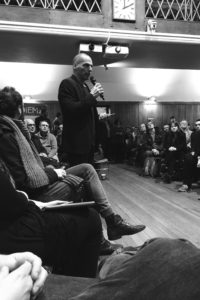
Yanis Varoufakis
At this point, Varoufakis offered his view on what he hoped this meeting will be able to begin to bring about:
“At the moment, we have this image of being a nice collection of people who have interesting things to say about Europe. But who cares about Europe we’re now out of Europe and we have serious problems now to consider in this country!? So DiEM is irrelevant. And they are right! And they are also right to think that we’re useless and irrelevant as long as we fail to convince them that we have something pertinent to say about daily life in this country. And [this is also true] as long as we fail to project the essential respect that we must have for people’s emotions, as Elif said, for the genuine spirit of discontent amongst those who voted for Brexit. Now DiEM came out of resistance, throughout Europe, to the scapegoating of the weakest citizens for the failures of the establishment. I think that it is essential to understand that the majority of those who voted for Brexit are our people. If we don’t see that, we might as well just go home and watch television. It is essential that poor whites in Leeds, in Wales, in the suburbs of London, in the inner city, get a feeling from us that we understand their plight and that we respect their concerns, their worries, their fears, their angst, just as much as we do that of the Polish immigrants, of LGBT people, of the minorities, of the Greeks, the Turks and so on and so forth. If we fail to do that in a British context we’re irrelevant. We’re just another irrelevance that speaks good prose.
Remember what we’re trying to do today. We’re going to transform DiEM25 into a British organisation. Maybe we should have a different name for it — to signify that it is now addressing British concerns and it is putting forward proposals for dealing with the real sources of discontent. And there are two of them:
Involuntary under-employment, which is the bitter fruit of austerity and involuntary immigration, which is the bitter price we have to pay for an economic model which concentrates all decent jobs in very small areas forcing people from the north of this country to migrate to London, from Poland and Bulgaria to migrate to Britain, to Germany or to France.
If we don’t manage to put forward, as a British organisation, a proposal for a New Deal for the United Kingdom and then, once we do that, to explain and to convince the people in the north of England in particular, that this must go hand in hand with a New Deal for Europe, we will have failed. Thank you.”
Srećko Horvat then opened the meeting to the floor and the following questions and points were raised. In what follows, the individual points of the discussion are summarized in short paragraphs.
Responses from the panel:
Elif Şafak noted that Turkey experienced how politics could all too easily divide family and friends and the biggest mistake would be to go back to identity politics. Dualities are unhelpful and we repeat them at our peril because the only the popularists will benefit from such a politics. She added that we shouldn’t leave patriotism to the nationalists or faith to the religious. In the end this is all about solidarity; it’s about the knowledge that history can go backwards and that it’s OK to love one’s country but only insofar as we always remember we are more than that. She also emphasised that popularists have a big problem with pluralism. Therefore, it is important to emphasise multiplicity and to refrain from binary oppositions and polarisations etc., to remember we live in a liquid world and need to reach out to people outside our own echo chambers.
Şafak responded to the earlier question about the role of literature from the floor and noted that this is a question which has been asked throughout history. Her feeling was that we must continue to write our poetry etc. and that it’s not just a luxury to continue to write. Popularists aim to dehumanise the other but, she reminded us, story tellers can re-humanise the other and combat this. As such, engaging in literature is a vitally important thing to be doing.
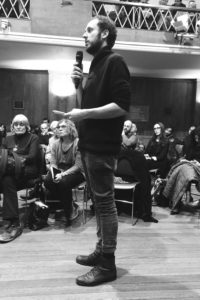
Srećko Horvat, DiEM25 Coordinating Collective member
Brian Eno pointed out that societies cohere either around hope — the idea that we can build a better future together — or around fear — the idea that the future is dangerous so we must stick together to fight it off. He felt that over the past twenty years fear had dominated. He observed that governments like fearful populations because they’re easier to control. On the other hand, populations that aren’t fearful but hopeful are creative and chaotic; it’s not easy to keep creative populations in line. He remarked that what we need is a creative population and that all of us were in one way or another present for that reason.
Eno also thought it was important to address precarity in general and for us to move beyond the idea that human beings are merely units to be plugged into any job that happens to be going. He thought we were being turned into third-world sweat shop workers (or at least he felt that this was what working people feel) — people no longer respected as humans. His hope was that in DiEM25 we could begin to build a future that is hopeful and that revolves around the idea that we could make something, not just as good as the old days, but something better than has existed before.
Yanis Varoufakis concluded by picking up on this point of Eno’s that for hope to flourish it needs a vision of a creative population that is not kept in line by fear. Indeed, he thought that this should also be our vision. However, he was insistent that none of this is going to happen if we have these meetings, feel fantastic and then do nothing afterwards. Therefore, he said, it is important that this meeting produces teams of people that make it their business, not only to spread the word, but to create a narrative that speaks to people’s needs out there and which doesn’t just speak to great universal principles. For Varoufakis the three basic needs to which we must speak are as follows:
1) The need for job creation — without investment he noted there is no job creation. Investment in physical, wealth producing stuff (machines and people) is the lowest in Britain today since 1945.
2) The need for basic social housing to reverse the Thatcherite malaise of council house sales. There has to be a programme to restore to people the ability to live in a decent home in their own communities without the need to leave to live and work elsewhere. he observed that if we don’t do this all our emotional intelligence and poetry will be wasted.
3) The need for a Universal Basic Dividend. Varoufakis pointed out that one of the greatest fallacies of capitalism and of free market ideology is that wealth is created individually and then appropriated through the tax system by the state. The reality is, he noted, exactly the opposite — wealth is created collectively and then privatised. Since capital is produced socially it should be enjoyed socially. In the light of this Varoufakis told the meeting that DiEM25 has been developing a policy, not of a Universal Basic Income, but of a Universal Basic Dividend. This would not be funded by taxation but through a Trust Fund into which a percentage of the shares of every corporation is to go, where the dividends amass, and which are then distributed to all as a Universal Basic Dividend. In Varoufakis’ opinion this is the only way to share the returns of automation across society.
Varoufakis was concerned to point out that these ideas were just some of that need to be taken out into the real world where real people discuss their real needs. What’s needed, in his mind, is a New Deal. He asked the meeting to remember that Roosevelt’s New Deal was designed to address fear and the fear of fear. Consequently, he felt we must come out of this meeting with a determination to get together to put forward very realistic, moderate proposals for what can be done tomorrow to fund a Universal Basic Dividend, social housing and a jobs programme.
Varoufakis offered this as a small example of what could be done now. He reminded us that the Bank of England has been printing money now for many years in order to refloat the financial sector, buying, in other words the debt of the financiers. Now, if instead of that, he asked us to imagine what would happen if we had a Public Investment Bank, like the Post Office used to have (the Post Office Savings Bank) issuing bonds? The Bank of England could buy them and then that money could go directly into research and development into, for example, green energy. This he said was one simple practical proposal that could be part of a New Deal for Britain which could address the syndrome of TINA (There Is No Alternative). He pointed out that we don’t need a socialist revolution before we can offer an alternative, in fact, the Bank of England could do it almost immediately in conjunction with a Public Investment Bank that could be created within six months. So, he asked, “Why are we not doing it?” In his mind the rage of people must be directed at the question of “why are we not doing that which we could do today within the capitalism we have? Not to create socialism but in order to stabilise the society we have and address basic human needs.”
Varoufakis felt that if the discussion is about what can be done in Britain today — forget Brexit, forget what we want the European Union to be — in order to address these basic needs then he trusts that it will be very, very simple to bring Europe back into the conversation. Because, when you start thinking about the three basic needs in Britain suddenly it becomes automatic to link this to the importance of a similar deal for France, for Germany and for Europe. It becomes clear — as the Greens realise in connection with climate change — that you cannot properly deal with important matters on your own; there has to be an alliance between all these countries implementing similar policies.
Varoukais said that the proposal he is putting on the table of this meeting is for a New Deal for the UK based on four or five areas where we can develop simple, moderate common-sense policies that will appeal to all people, without any mention of Brexit, the EU, Europe or even DiEM25. He felt that once we start such a conversation then we will create the political infrastructure for people from Labour, for people who are progressive Conservatives, for people from the Greens, for independents who are disillusioned, for those who are not currently politically involved. His hope is that when we are no longer just in Conway Hall but everywhere, then the discussion about Europe will return in a civilised way which allows people to avoid the false binary opposition that exists between official remain and Brexit.
Varoufakis began to conclude with a point about popularism. He did not believe it was possible to be both a democrat and a popularist; democratic popularism is for him a contradiction in terms. In his definition “popularism is the tactic of promising all things to all people without meaning any of them in order to usurp popular consent and then turn it against the people.” Varoukakis emphasised that this was why he was a democrat and insisted that we in DiEM25 should be in the business of putting the demos back into democracy. He acknowledged that to do this we needed to become popular but not at the expense of embracing popularism. He added that the UK manifesto must, therefore, include very simple ideas about how to put the demos back into British democracy.
Lastly, he reminded the meeting that Burkean Tories talk about restoring sovereignty to the British Parliamentary system and he thought “we needed to adopt that, to steal it from them because it’s a fantastic idea. But they will not do it, only we can do it because they don’t want to do it. They are really popularists, using the language of democracy in order to deny it to anyone except themselves. They want democracy for the rich, for those who are in surplus, and deny democracy to those they considered discarded, morally defective and therefore poor. It is essential that we restore that and we introduce constitutional proposals in the UK Manifesto of DiEM.”
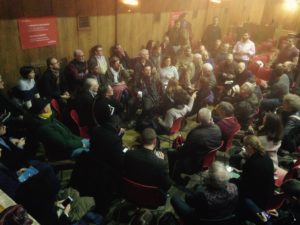
The meeting then broke up into four small working groups with the following themes:
- The drafting of the UK Manifesto and to consider a name for DiEM25 in the UK.
- Media/Communications
- Barebones organisation including fundraising
- DiEM25 Voice — the artistic core.
Reports of progress from these groups will be forthcoming in the coming weeks.
Yanis Varoufakis began to draw the meeting to a close by announcing that there were to be two more groups which people could join and sign-up to at the close of the meeting. The first was one to discuss a UK economic policy that would parallel the Green New Deal for Europe which will be formally launched in Rome on 25th March (the sixtieth anniversary of the EU).
The second group was one which would focus on the alliance building that DiEM25 in the UK needs to develop.
Varoufakis finished by making it clear to the meeting that
“DiEM25 wants to be as inclusive and anti-sectarian as possible. The intention is not to create a party that goes against Labour, the Greens, the SNP. Rather the objective is to become the movement that energises them at long last to get their act together. So we need alliances, with Labour with the SNP, with progressive Conservatives, with anyone with sense and sensibility who is willing to participate in the attempt to create a progressive international insurgency against the insurgency of the neoliberals and against the insurgency of UKIP.”
The meeting concluded with a few further points from the floor.
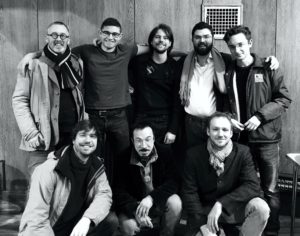
The movement’s Volunteers Coordinator, Judith Meyer, reminded people that they could be in touch with DiEM25 by emailing info@uk.diem25.org
A question was asked about the Labour Party’s decision to force MPs to vote for the triggering of article 50. Varoufakis replied by outlining the current DiEM25 position that was recently decided by referendum within DiEM25’s membership. This can be found on the DiEM25 website.
The final comment came from a woman who came to the meeting with her daughter because both her children had felt so hopeless about their future after the Brexit vote. She wanted to thank the meeting for giving her, and her daughter, things to do and hope for the future.
There can have been no one present who didn’t agree with Yanis Varoufakis when he said he could think of no better way to end this meeting.
Do you want to be informed of DiEM25's actions? Sign up here





